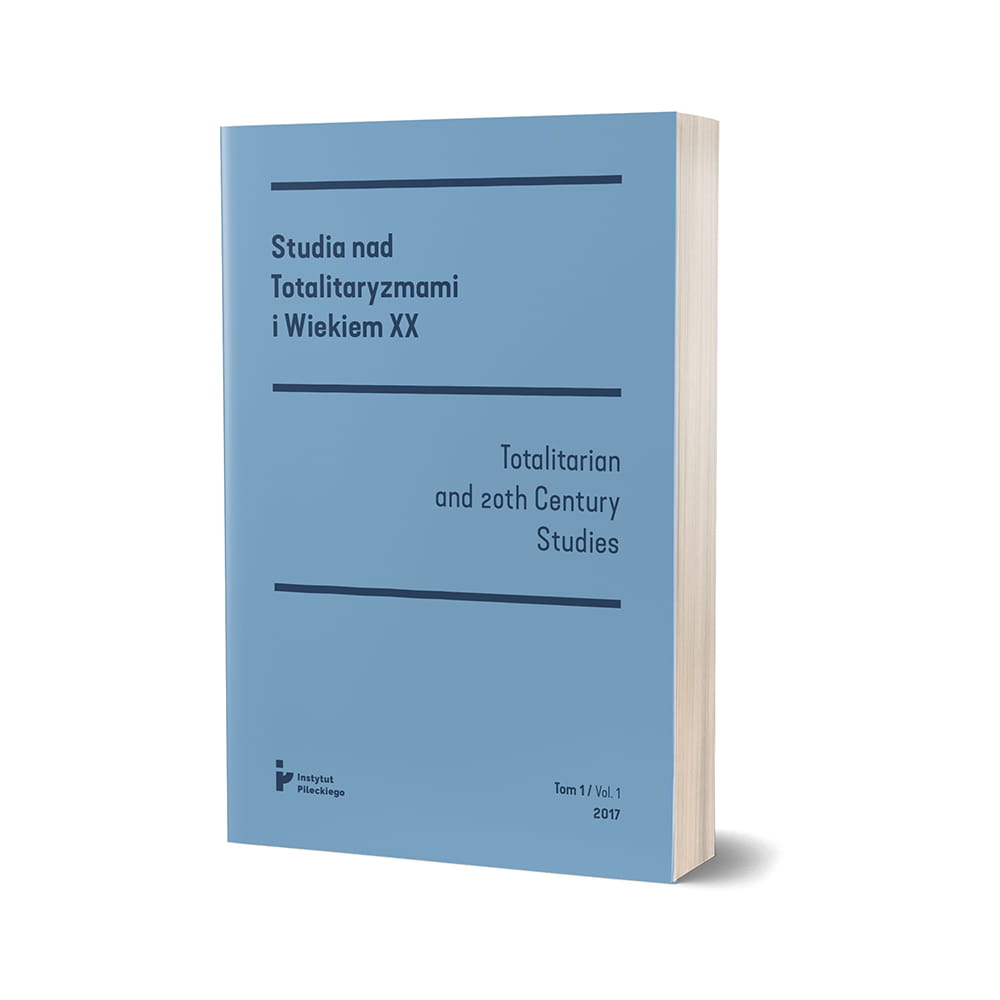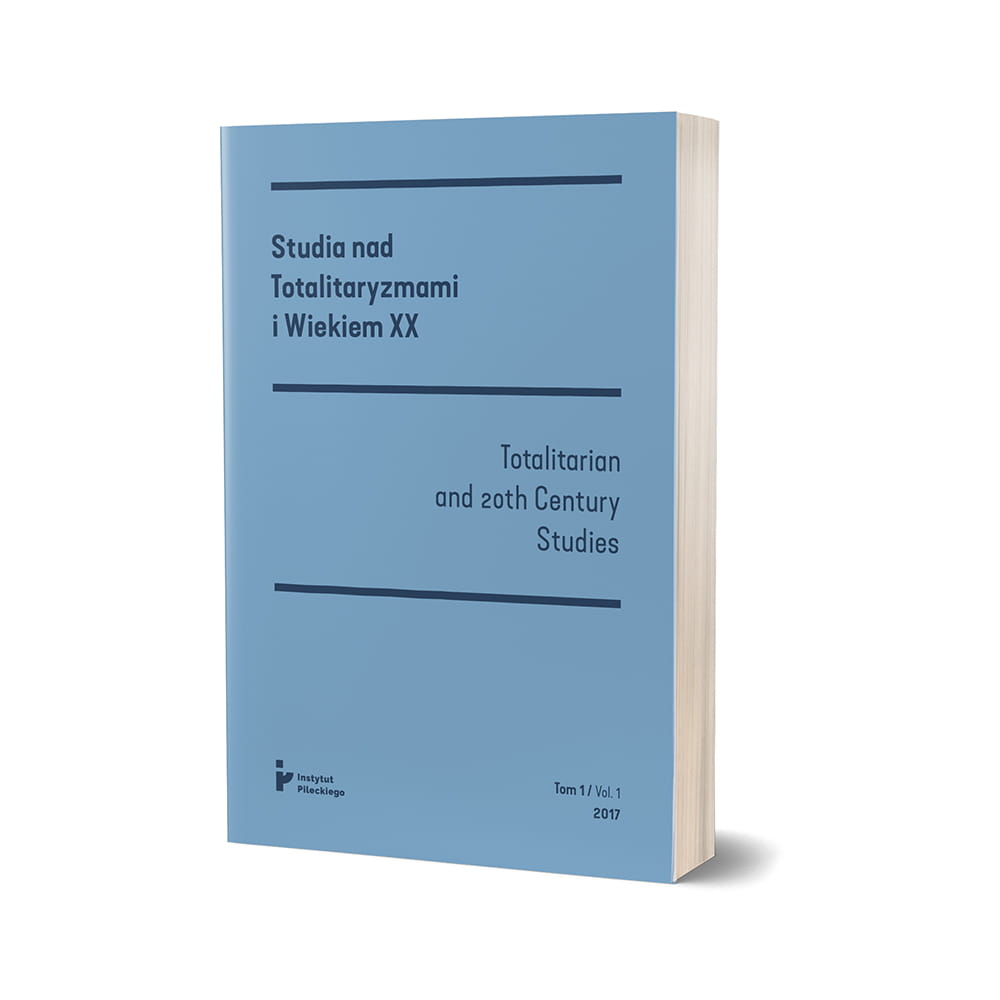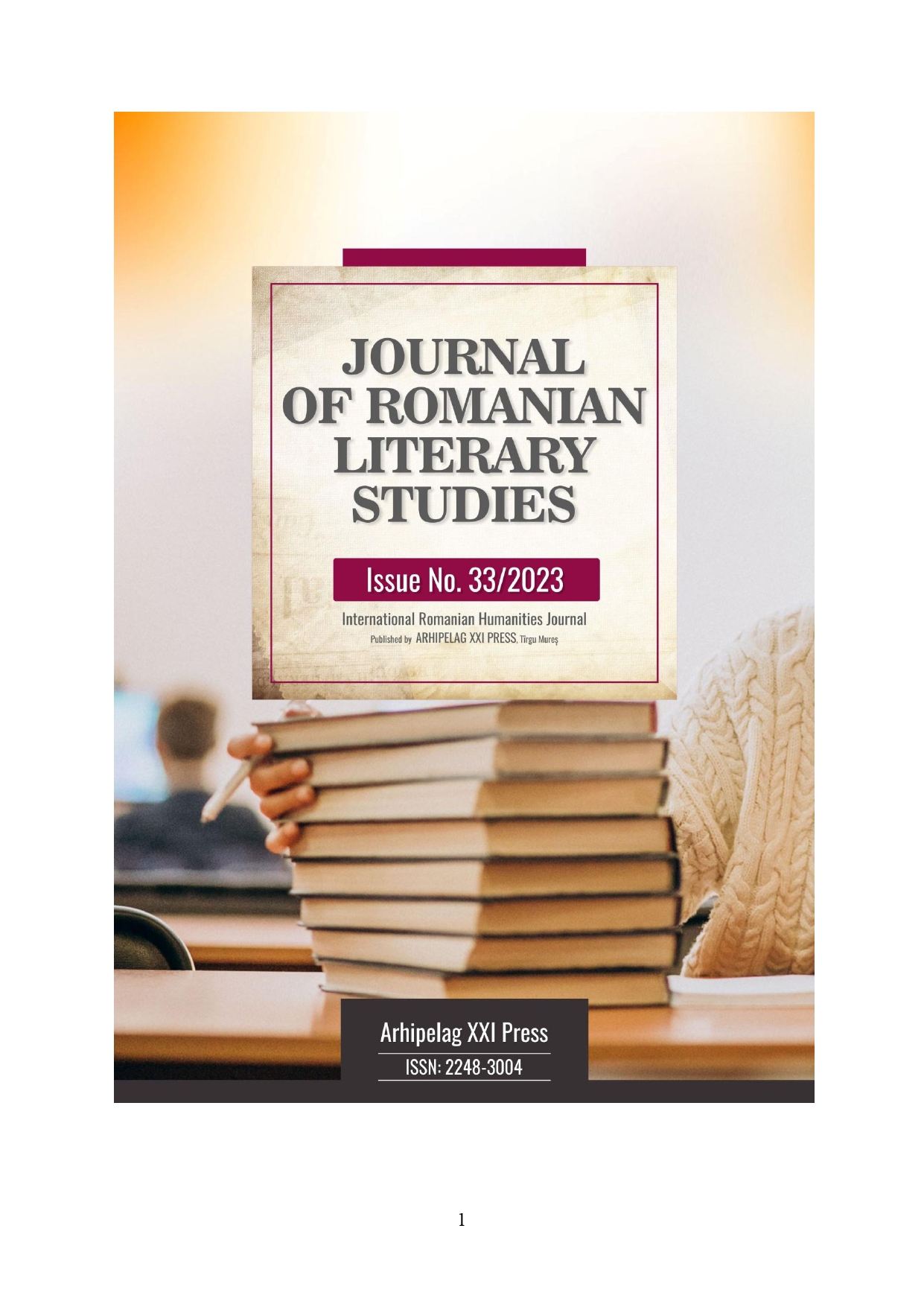


The Polish Intelligentsia: The Emergence and Transformation of the Social Group and its World View
The Polish Intelligentsia: The Emergence and Transformation of the Social Group and its World View
Keywords: Polish Intelligentsia
The aim of the paper is to present the discussion on the origins of the Polish intelligentsia and to describe the process of its development from the Enlightenment until the Second World War. The author examines the emergence of the educated bourgeoisie in the 18th century and proceeds to consider the impact of the partitions. The Napoleonic Duchy of Warsaw (1807–1815) and the constitutional Polish Kingdom with the Russian Tsar as King of Poland (1815–1831), provided the Polish intelligentsia with official jobs and permitted it to develop as a stratum of state servants. After the lost Uprising of 1830/1831, thousands of educated people had to emigrate. They developed a new ideology, a branch of European romanticism that extolled sacrifice and the fight for freedom and independence. As opposed to it, another ideology of gradual “organic work” appeared in the 1840s in Prussian Poland; the rivalry of these two approaches would from that moment become one of the defining features of Polish intellectual life.
More...
On Polish Opinions and Deliberations Concerning National Socialism and the III Reich
On Polish Opinions and Deliberations Concerning National Socialism and the III Reich
Keywords: National Socialism; III Reich
In his article the author analyzes selected opinions of Polish politicians, social scientists and intellectuals on National Socialism from the period of 1933–1948. The first part of the paper is devoted to the insights provided by politicians, diplomats, and military figures of the Second Polish Republic, such as Roman Dmowski, Józef Piłsudski, Józef Beck, and Władysław Sikorski. Next the author comments upon intellectual discussions held in Poland and concerning the definition of the III Reich, its legal and systemic aspects, as well as social foundations. The author also analyzes the impact the outbreak of the War and the enormities committed by the Germans had on the Polish debate. He cites remarks offered by lawyers – such as Rafał Lemkin and Konstanty Grzybowski, sociologists – including Aleksander Hertz and Stefan Czarnowski, theologians – such as Father Jan Piwowarczyk, and finally writers, for instance Zofia Nałkowska.
More...
“Excess of Forgetting and Excess of Memory” in Polish, German and Austrian Narratives on World War II
“Excess of Forgetting and Excess of Memory” in Polish, German and Austrian Narratives on World War II
Keywords: World War II
In his extraordinary book titled Memory, History, Forgetting, Paul Ricoeur writes thus: “I am deeply troubled by the disturbing spectacle of the excess of memory in some places and the excess of forgetting elsewhere”. The events of World War II affected the Polish and the German nations in completely different ways. As perpetrators of the tragedy, the Germans were to some extent confronted with war crimes (the Nuremberg Trials, the Frankfurt Trial, the Düsseldorf Trial). But have the war crimes and the mechanisms of functioning of the Third Reich become common knowledge?
More...
Polish Clergymen as Victims of KL Gusen
Polish Clergymen as Victims of KL Gusen
Keywords: KL Gusen
The concentration camp of KL Gusen was one of the main extermination sites for the Polish clergy, and especially that of the Roman Catholic denomination. Out of approximately 34,000 Poles detained in this camp, some 300 were clergymen (according to partial data). Many were imprisoned both as representatives of the Polish national elite – intended for extermination in accordance with the genocidal policy of the German National Socialist regime – and for religious reasons. In the camp, religious practices were forbidden and punishable by death. According to survivors’ accounts, the camp personnel subjected priests to especially brutal treatment. The martyrdom of the victims of KL Gusen has been commemorated by means of three special rosaries containing the ashes of the murdered, which were deposited in the Jasna Góra sanctuary in Częstochowa, in St. Anne’s Church in Warsaw, and in Wrocław Cathedral. Former prisoners of KL Gusen also made votive offerings during the second visit of Pope John Paul II to Poland in 1983.
More...
The Murders of Priests at Hartheim Castle under “Sonderbehandlung 14f13”
The Murders of Priests at Hartheim Castle under “Sonderbehandlung 14f13”
Keywords: Sonderbehandlung 14f13
In the years 1940–1944, Hartheim Castle served as a Nazi euthanasia center, in which people were put to death on a mass scale. From May 1940 to August 1941, over 18,000 people were murdered there under Action T4, while between August 1941 and November 1944 more than 10,000 prisoners of concentration camps and forced laborers were in the Castle. The latter group included 330 priests who were brought to Hartheim mainly from Dachau, but also from Mauthausen-Gusen. According to our present knowledge, at least 310 of them came from Poland. Considered by the occupier as enjoying high social and political standing, they were arrested and deported as part of the Nazis’ systematic effort to eliminate the Polish intelligentsia and Polish leadership elites. Using selected examples, the paper examines what exactly the priests experienced on their way to the concentration camps, and also the circumstances that accompanied their deaths at Hartheim Castle.
More...
The Fate of the Professors of Belgrade University under German Occupation, 1941–1944
The Fate of the Professors of Belgrade University under German Occupation, 1941–1944
Keywords: Belgrade University
The University of Belgrade was one of the most important educational and scientific institutions in the Kingdom of Yugoslavia. On the eve of the Second World War it employed some 300 didactic personnel. The present article depicts the typical experiences of distinguished Belgrade University professors during the Second World War and the occupation of Belgrade in the years 1941–1944.
More...
From Annihilation of the Elites to Total Annihilation: Serbs in the Independent State of Croatia, 1941–1942
From Annihilation of the Elites to Total Annihilation: Serbs in the Independent State of Croatia, 1941–1942
More...
The Soviet Intellectual in Vlasov’s Movement: the Cases of Zykov, Samygin, and Glinka
The Soviet Intellectual in Vlasov’s Movement: the Cases of Zykov, Samygin, and Glinka
More...
Henryk Sławik as a Patron. Reviving the Memory of KL Gusen
Henryk Sławik as a Patron. Reviving the Memory of KL Gusen
More...

NICHITA STĂNESCU. A POETICS OF THE FRAGMENTARY
NICHITA STĂNESCU. A POETICS OF THE FRAGMENTARY
Keywords: poetics; fragmentary; language; negation; communion;
Many of Nichita Stănescu's poems have the vibration of a poetic creed, the lyrical images exposing a conception of art, poetry, incompleteness, but also a poetics of the fragmentary, the scenario of creation being energized by the idea of sacrifice, self-sacrifice and communion through love. Existence itself is perceived under the sign of paradox and antinomies, whereby the multiple, the spiritual and the corporeal, the dynamic and the static seem to be devoted to the complementary and fascinating meanings of existence, the relation of the self to being ambiguous, insofar as affirmation and negation, essence and phenomenality, come together in the combinatory games of consciousness and language. Fragmentary writing meets the fragmentary world, major meanings dissolve, they reflect the disintegration of the coherence of things.
More...
FICTION AS REALITY OR REALITY AS FICTION IN IAN MCEWAN’S “ATONEMENT”
FICTION AS REALITY OR REALITY AS FICTION IN IAN MCEWAN’S “ATONEMENT”
Keywords: God; creation; guilt; atonement; war;
“Atonement” definitely strikes as a complex, intricate narrative structure. Ian McEwan –the narrator, in fact - constantly plays with the readers, manipulating, deceiving, misleading them until the very end of the novel. Briony Tallis, an ailing, aged novelist finally owns having been the author all along. As a last, surprising ‘stratagem’ she even gives two completely different endings to her story, the fictitious one but also the ‘real’ one. Thus, “Atonement” is no longer just the story of guilt and expiation but a masterfully wrought novel about misinterpretation. This article endeavors to trace back the two threads: the fictitious and the ‘real’ one, which, in fact, is fiction as well.
More...
THE EDUPRENEUR: EMPOWERING EDUCATION THROUGH ENTREPRENEURIAL INNOVATION
THE EDUPRENEUR: EMPOWERING EDUCATION THROUGH ENTREPRENEURIAL INNOVATION
Keywords: edupreneur; education; creativity; innovation; edupreneurship;
This paper examines the concept of edupreneurship and its impact on the education system. Edupreneurship is an innovative approach that combines elements of entrepreneurship and education, aiming to transform and improve the learning process. The paper highlights the main characteristics of edupreneurship, including initiative, creativity, risk-taking and entrepreneurship. The benefits of edupreneurship in terms of developing key 21st century skills such as critical thinking, problem solving and collaboration are also analysed. A relevant case study is also presented, illustrating how edupreneurs are contributing to the transformation of education systems in Romania. The paper highlights the importance of support and collaboration between education, business and government to promote edupreneurship. By implementing edupreneurship, we can create an educational system adapted to the needs of society and prepared for the challenges of the future.
More...
GROTESQUE TONGUE-IN-CHEEK: ROSES FOR GOOD COUNTRY PEOPLE
GROTESQUE TONGUE-IN-CHEEK: ROSES FOR GOOD COUNTRY PEOPLE
Keywords: Faulkner; O’Connor; Southern Gothic; grotesque; irony/tongue-in-cheek;
Faulkner’s “ A Rose for Emily” and O’Connor’s “Good Country People” have already been compared or read together quite a number of times, especially in terms of their portrayal of character and community, insanity and other psychological features of the female protagonists, the uses of irony in their “Southern Gothic” settings, symbols, morality and religion, or style as such. Our own paper looks at structural elements, organization, the role of space and setting, the heroines themselves and the two villains, other characters and the role of the two communities, vision and language use, and the grotesque tongue-in- cheek lessons offered by the two great authors. However, let it also be said that the comparative effort behind this paper is less important than the occasion it offers for a parallel interpretation of two excellent stories, whose theme places them at the very heart of literature.
More...
LAKOTA NATIVE AMERICANS VS WHITE PEOPLE IN WEIDEN’S WINTER COUNTS
LAKOTA NATIVE AMERICANS VS WHITE PEOPLE IN WEIDEN’S WINTER COUNTS
Keywords: Native Americans; white people; relationship; conflict; tension; suffering; justice;
The present study aims at analyzing the relationship between the Lakota Native Americans and the White people in David Heska Wanbli Weiden’s novel entitled “Winter Counts”, how things evolved, what changes may appear with time and the reasons for which there is so much tension and conflict between them. This work lays emphasis upon issues, such as: justice for the white people versus justice for the Natives, the differences between their institutions, their ways of doing things, their beliefs, cultures and history. The relationship between the Natives and the White people is complex tackling every aspect of their lives and connecting with other issues both groups face. There are a lot of things that could improve their relationship, but unfortunately there is little desire to try and fix things. Both sides just go on doing what they used to do, none of them stopping for a second to try to communicate and find a solution that would make everything better. There are issues, such as: substance abuse, crimes that go unpunished, starvation, poor education, poor health, lack of acceptance and lack of opportunities. With a little patience, the two groups could fix some of these issues, but instead, everything just gets worse and no one claims responsibility for the people’s suffering.
More...
CHALLENGES AND BENEFITS OF TEACHING ROMANIAN AS A FOREIGN LANGUAGE IN A MULTICULTURAL CLASS
CHALLENGES AND BENEFITS OF TEACHING ROMANIAN AS A FOREIGN LANGUAGE IN A MULTICULTURAL CLASS
Keywords: cultural awareness; intercultural communication; language proficiency; authentic material; multicultural literature;
This study has been devised having several reasons as a starting point. A teacher of Romanian as a foreign language must be able to understand cultural diversity in a multicultural class. There is no precedent of this type of class in the Romanian educational system. Due to immigration, the world has become “a small village”, therefore Romanian teachers have had to adapt to this new sociopolitical context. During communism, Romanian teachers had mostly monocultural classes (with very few exceptions in certain areas in the country) and thus students had many things in common, in theory. Nowadays, in multicultural classes, teachers of Romanian as a foreign language are facing several challenges and they have to use communication skills and a thorough cultural background.
More...
EXAMPLES OF HAIKU DEVIATIONS FROM RULES
EXAMPLES OF HAIKU DEVIATIONS FROM RULES
Keywords: Buddhism; moments of revelation; nature; city; metaphor;
The purpose of the present paper is to understand haiku poems not from the perspective of expected rules, but, instead, from the way these rules are broken. This phenomenon is visible in present day haiku, as a means of experiment, but also as a means of showing that we can be the product of several cultures, and that our perception can be influenced by our previous education and experience, while we can also acquire new ways of seeing life. The haiku poem is very adaptable to all ages and cultures, which is why it is so popular.
More...
LOUIS HENRI BOUSSENARD-BETWEEN PICARESQUE NOVEL AND MEDICINE
LOUIS HENRI BOUSSENARD-BETWEEN PICARESQUE NOVEL AND MEDICINE
Keywords: medicine; literature; picaresque novel; nationalistic nostalgia; adventure;
Medical studies, knowledge of the human spirit and adventurous character characterized some of Asclepius' disciples. This is also the case of the French doctor and writer Louis Henri Boussenard (1847-1910) who traveled through the French colonies as a doctor, bringing together his life experiences in unique literary pages. Following the Franco-Prussian war, Louis Henri Boussenard remains with a nationalistic nostalgia that can be found in some of his literary writings. Satirical accents, the use of slang language and the investigation of social mores are some of the characteristics of Boussenard's novels demonstrating the acuteness of this doctor's observation.
More...
EQUIVALENCE AND ITS IMPLEMENTATION IN THE FIELD OF TRANSLATION
EQUIVALENCE AND ITS IMPLEMENTATION IN THE FIELD OF TRANSLATION
Keywords: translation; equivalence; freedom in translation; genre; audience;
The concept of equivalence is one of the most frequently used theoretical terms in the area of translation studies. However, in spite of its being so widely employed, it is still a concept which is rather difficult to pin down and define accurately. While some theoreticians equate equivalence to the practice whereby the target text achieves an identical function to the source text, others speak about the degree of replication of the textual situation in the source text by means of different wording in the target text. Yet other theoreticians talk about the transfer of meaning between source and target text, while others define equivalence as the act of replicating in the target text the most similar natural equivalent of the source language meaning. Last but not least, some theoreticians believe that perfect equivalence does not, in truth, exist. In the present paper we have attempted to reconcile all these diverging views on equivalence, by discussing such concepts as freedom in translation, level, genre, audience, lexicon, hierarchy, ellipsis and compensation.
More...The search is temporarily unavailable.
We apologize in advance for the inconvenience and thank you for your kind understanding.
